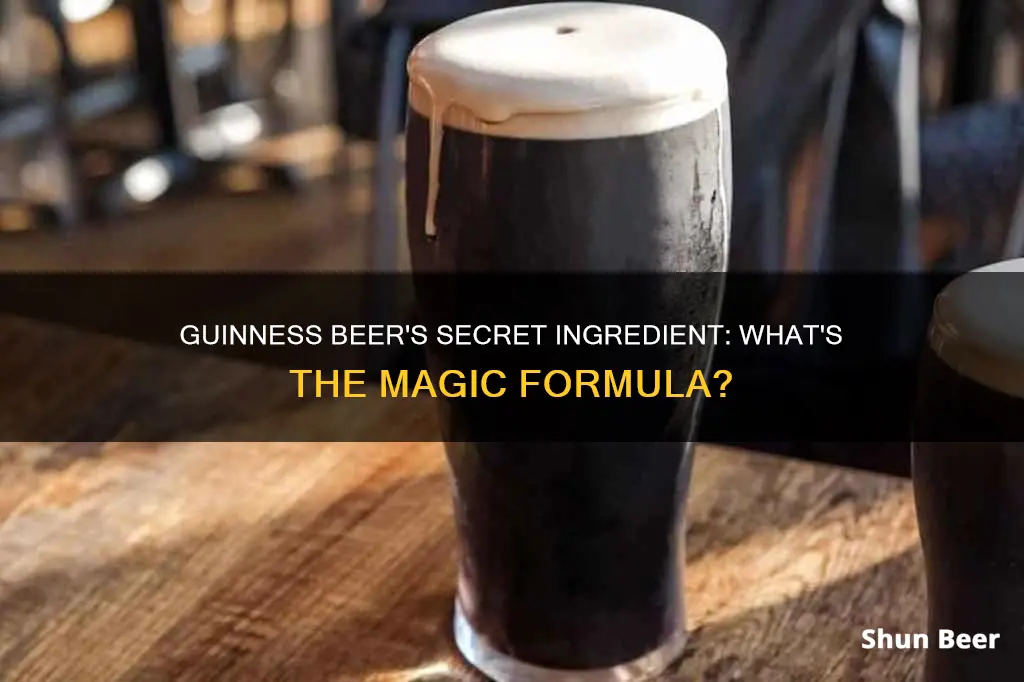
Guinness beer is one of the most popular alcoholic drinks worldwide, with over 10 million glasses enjoyed daily. The key ingredients in Guinness are roasted barley, malted barley, hops, yeast, and water. The roasted barley gives Guinness its distinctive dark colour and unique taste. Hops add bitterness to balance the sweetness of the malt and act as a natural preservative. Yeast is vital for fermentation, converting sugars from the barley into alcohol. The water used in the brewing process is sourced from the Wicklow mountains in Ireland, chosen for its purity and soft, low mineral content. In addition to these core ingredients, Guinness also contains nitrogen, which gives the beer its iconic creaminess and smooth texture.
| Characteristics | Values |
|---|---|
| Main ingredients | Water, barley, hops, yeast |
| Other ingredients | Nitrogen, carbon dioxide |
| Filtration process | Isinglass from fish bladders (old), new state-of-the-art filtration process (new) |
| Alcohol by volume (ABV) | 4.1% to 8% |
| Calories | 35kcal to 64kcal per 100ml |
| Carbohydrates | 2g to 7.5g per 100ml |
What You'll Learn
- Water: Sourced from the Wicklow mountains, it's essential for brewing
- Barley: Malted and roasted barley gives Guinness its dark colour
- Hops: Guinness contains a higher hops content than most beers
- Yeast: Converts sugars from the barley into alcohol
- Nitrogen: Added in the 1950s, it gives Guinness its creaminess

Water: Sourced from the Wicklow mountains, it's essential for brewing
Water is one of the key ingredients in beer, and Guinness sources its water from the Wicklow Mountains. This water has very low mineralisation and alkalinity, which is unusual compared to most water supplies around the world. The soft water from the Wicklow Mountains is essential for brewing Guinness's signature stout, as it helps to create the crisp, acidic flavour that the beer is known for.
Guinness has a long history of brewing expertise, dating back to the 18th century when Arthur Guinness started brewing ales at St. James's Gate Brewery in Dublin, Ireland. Over the years, Guinness has perfected the art of brewing, and the choice of water source is a crucial factor in the brewing process.
The Wicklow Mountain water is known for its low mineral content and alkalinity, which sets it apart from other water sources. This unique characteristic of the water helps to create the distinct taste and texture of Guinness stout. The water's low alkalinity contributes to the crisp, acidic flavour that is synonymous with Guinness.
Guinness has built its reputation on the consistent quality of its beer, and the use of Wicklow Mountain water plays a vital role in maintaining this consistency. While the exact brewing process and ingredients remain a closely guarded secret, it is known that the water source is a key element in creating the distinctive flavour profile of Guinness stout.
In addition to its use in brewing, the Wicklow Mountain water has also become a symbol of the Guinness brand. The company has emphasised the importance of this natural resource and its role in shaping the unique character of their beer. The connection between the Wicklow Mountains and Guinness has become an integral part of the brand's identity.
Guinness Beer: Meat-Free, But What's the Verdict?
You may want to see also

Barley: Malted and roasted barley gives Guinness its dark colour
The dark colour of Guinness is due to the malted and roasted barley used in the brewing process. The barley is roasted at a high temperature of 232 degrees Celsius, which causes it to turn a deep, dark brown colour. This roasted barley gives Guinness its distinctive flavour as well as its dark colour.
Barley is a grain that is used to make beer. It is a source of fermentable sugar and gives the beer its alcohol content. The barley is malted, which means it is soaked in water and allowed to germinate. This process helps to release the sugars from the barley.
Guinness uses a specific type of barley called malted barley. The malted barley is then roasted to a rich black finish, which gives Guinness its dark colour and characteristic flavour. The roasting process reduces the bitterness of the barley, making it sweeter and more mellow, resulting in the smooth, creamy taste that Guinness is known for.
The quality of the ingredients, attention to detail, and traditional Irish know-how all contribute to the distinct taste and colour of Guinness. The barley used in Guinness is sourced from local farmers, some of whom have been growing barley for the brewery for generations.
In addition to the malted and roasted barley, Guinness also uses hops, yeast, and water in its brewing process. The hops add flavour and bitterness, while the yeast converts the sugars in the barley into alcohol. The water is purified before being used and is a vital part of the brewing process.
The combination of these ingredients and the brewing process gives Guinness its unique dark colour, flavour, and smoothness.
Football Stars in Guinness Beer Ads: Who's Featured?
You may want to see also

Hops: Guinness contains a higher hops content than most beers
Hops are a key ingredient in beer, used to add flavour. In the case of Guinness, the hops are what give the stout its famous bitter taste.
Guinness contains a higher hops content than most beers. The hops content is even higher in the Foreign Extra Stout (FES) variety, which is more heavily hopped than Guinness Draught and Extra Stout. The extra hops were originally intended to act as a natural preservative for the long journeys the beer would take by ship.
The higher hops content of FES gives it a more bitter taste and a higher alcohol content (around 7.5% ABV) than other Guinness varieties. FES is the most common variety of Guinness found in Asia, Africa, and the Caribbean, and it accounts for almost half of Guinness sales worldwide.
The Irish version of FES is brewed with bitter Galena, Nugget, and Target hop varieties, which have undergone an isomerized kettle extract process. It contains about a third more hops than Guinness Draught, and nearly double the amount of roasted barley.
Guinness Beer Widget: What's Its Purpose?
You may want to see also

Yeast: Converts sugars from the barley into alcohol
Yeast is an essential ingredient in the brewing process of Guinness beer. It is responsible for converting sugars from the barley into alcohol, giving Guinness its distinctive flavour and characteristics.
The type of yeast used in Guinness is a closely guarded secret, known as a "special blend" that is "proprietary to Guinness." This yeast is a key factor in what makes Guinness unique among other beers. While the exact amount of yeast used is not publicly disclosed, it is known to be a significant quantity. The importance of yeast to the brewing process is further emphasised by the dedicated yeast plant built in Cork, Ireland, in the early 1900s, which produces the yeast for all Guinness beers.
Guinness uses a bottom-fermenting yeast, which ferments at a lower temperature than other yeasts. This contributes to the distinct flavour profile of Guinness, resulting in a beer that is less fruity and more malty. The extended fermentation period also allows for the development of complex flavours and a smoother, creamier texture.
The yeast used in Guinness is a specific strain that has been passed down through generations. It ferments sugars derived from the malted barley, producing alcohol and carbon dioxide in the beer. The carbon dioxide contributes to the fizzy, bubbly quality often associated with beers.
In addition to its role in fermentation, yeast also influences the flavour and texture of Guinness. The unique strain of yeast used in Guinness contributes to the distinctive flavour that has made it one of the most popular beers worldwide. The longer boiling time of the wort, or unfermented beer, also creates a less sweet and more bitter taste profile.
The combination of the specific yeast strain and the brewing process gives Guinness its iconic flavour and texture, setting it apart from other beers in the market.
Guinness Beer: A Domestic or Foreign Affair?
You may want to see also

Nitrogen: Added in the 1950s, it gives Guinness its creaminess
Nitrogen is the secret ingredient that gives Guinness its distinctive creaminess. Added to the beer in the 1950s, it changed the texture and flavour of Guinness, giving it a "creamier" and "smoother" consistency compared to the sharper taste of traditional CO2-based beers. Nitrogen bubbles are much smaller than carbon dioxide bubbles, resulting in a smoother, subtler fizz that makes the beer taste thick and creamy. The nitrogen also gives Guinness its signature velvety head.
The addition of nitrogen to Guinness was pioneered by Michael Ash, a master mathematician turned master brewer who joined the company in 1951. Ash became fascinated by the idea of serving Guinness on draught and was convinced that adding nitrogen would not only be the most effective way to do this but also transform the beer itself. He developed the "Easy Serve" system, which created the famous "surge and settle" effect of draught Guinness. This was the world's first nitro beer.
However, bottling and canning Guinness with nitrogen presented a challenge. To achieve the same creamy texture as the draught beer, a dangerous level of pressure was required, and the nitrogen often escaped during the packaging process. To solve this problem, Guinness invented the widget—a small piece of plastic inside each can and bottle that absorbs nitrogen during packaging. When the can or bottle is opened, the widget releases a jet of tiny nitrogen bubbles, replicating the draught experience. The widget took two decades to perfect, and the first generation had issues with exploding when opened warm due to the high pressure. Since 1997, Guinness has been using an improved widget called the "Smoothifier," which works perfectly at any temperature.
The use of nitrogen in Guinness is a significant innovation that has contributed to its worldwide popularity. Today, Guinness is one of the most successful alcohol brands, brewed in almost 50 countries and available in over 120.
Guinness Beer: Pressurizing the Magic Balls
You may want to see also
Frequently asked questions
The key ingredients in Guinness are roasted barley, malted barley, hops, yeast, and water.
There is no single secret ingredient in Guinness. However, the quality of the ingredients and the brewing process are what make Guinness stand out.
The dark colour of Guinness comes primarily from roasted barley.
The alcohol percentage of Guinness varies depending on the product, ranging from 0% to 8% ABV.







